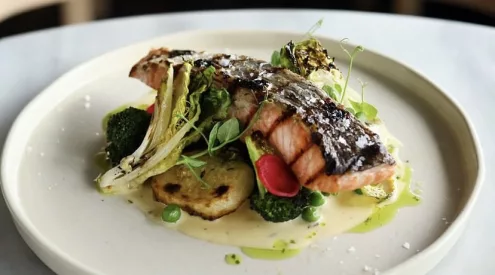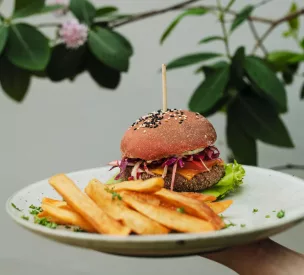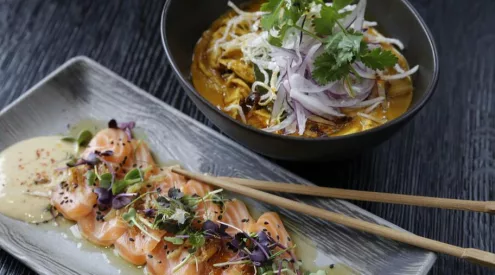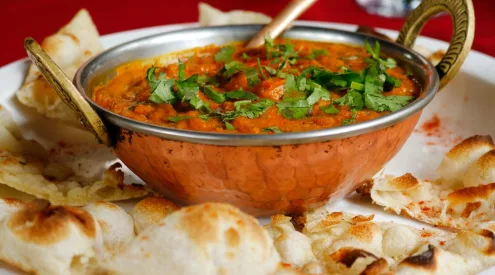For most people, coffee is what gets them up in the morning. For me, it’s a cup of rooibos. While I love the idea of coffee, its smell, the ritual of making a proper cup of java (not the horrible instant stuff), I just can’t help being a tea person. There are so many excellent places for a coffee in Cape Town, but there’s not really anywhere to go for a cup of amazing tea. Apart from Nigiro, that is.
Tucked at the back of one of Cape Town’s most popular (and best, by all accounts) coffee bars, Origin, is Nigiro (Origin backwards), a tea haven. It’s all rather zen – the lighting is dim and ambient, there’s a trickling stream running through the tea room, with quiet Asian tea-drinking music playing in the background.
You can just order a pot of tea from the extensive menu, your choice guided by the extremely knowledgeable tea baristas. Each tea comes with instructions – different teas are infused at different temperatures, and for varying lengths of time. The pot is kept warm by small tea lights burning underneath it, and your cup is warmed with hot water before you drink out of it. When you drink tea like this you realise what you’re missing out when you glibly dunk your tea bag in your cup every morning.
However, if you want to get the full tea experience from Nigiro, and to taste tea like you would savour wine at a tasting, I would highly recommend that you try out a tea ceremony or a tea tasting.
The tea ceremonies are performed in the traditional Taiwanese way, on a tea ceremony table imported from Taiwan. Taiwanese expat Mingwei Tsai, Nigiro’s owner, took us through a ceremony, taking us through the fascinating science of tea as he went along.
Mingwei stressed the importance of water in a tea ceremony, as he poured water all over our cups to warm them. We drank oolong tea, which is a semi-fermented tea grown in mountains of Taiwan. The first drop of tea is different to the last drop of tea poured out of a teapot, so the infused tea is first poured into a jug (called a “˜sea of tea’ in Chinese), which represents limitless tea. The tea is then poured into a fragrance cup. Your drinking cup is placed on top of the fragrance cup, and flipped over quickly. The fragrance cup is then gently removed. A pocket of air gets trapped in the drinking cup when you flip it, and moves up the fragrance cup, aerating the tea and making it more fragrant. A good cup of oolong is pretty memorable – it’s floral, subtle and slightly sweet, although the flavours change with each infusion of the tea leaves.
Oolong is an interesting tea, when you know a bit about it. It’s grown slowly in the high mountains, which is thought to imbue it with the energy of the mountain. Oolong harvested in different seasons has varying tastes – spring-harvested oolong tastes sweeter than the tea harvested in winter. In summer and autumn the plants grow faster, so the tea leaves release flavour quicker into the hot water when you infuse them.
Mingwei sees an important social function in tea ceremonies. People have to stop and force themselves to make the time to drink tea slowly and savour it fully. As he says “˜In Asian countries, many of which are among the most industrialised in the world, there’s a huge contrast in society – on one side, people are extremely efficient and time-pressurised, and on the other there is a stress on the importance of places where people can be silent and meditate. Tea houses form an important part of the quieting aspect of life.’
After the tea ceremony, we moved on to tea tasting, which was an intense sensory experience. We tried nine teas selected by Mingwei, which formed a full tea spectrum, from black, green, red to rooibos and herbal infusions.
We tried the most expensive green tea on the menu, which is sold for R300 for 100 grams – a Japanese gyokuro asahi. It was by far the most amazing tea I have ever tasted. It’s not at all like the often bitter green tea out of a tea bag – this was grassy, with a subtle, silky green taste. Gyukoruo asahi is the most expensive green tea in the world. The tea plants grow in the shadow of broad-leaved trees and are shaded by bamboo mats for weeks before plucking to boost their chlorophyll content, which results in the remarkable green taste of the tea.
On that high note, we made our way through the table of teas, trying another green tea flavoured with real peach pieces, Down to earth, a blend of lapsang souchon and Keemen, which was earthy and smokey, a beautifully and gently flavoured Earl Grey, and Chinese red tea – pu-err, which is popular in Hollywood for its cellulite-eliminating properties. Pu-err is grown in Yunnan province and and somtimes be fermented for several years. It’s sold at auctions for high prices like fine, aged wines.
The herbal teas we tried were delicious. There was Herbal Sundown, an infusion with lemon balm, peppermint, camomile, lavender, orange blossom, lemongrass and heather which was gentle and lemony – the perfect bedtime tea. A Pina Colada tea (a fruit infusion with apple, hibiscus, pineapple, coconut and rosehips) tasted just like the cocktail, minus the rum. As a rooibos-lover, I really enjoyed Tropical Paradise, a rooibos tea infused with tropical fuit, and Blood Orange – rooibos with blood orange essence.
The whole experience was pretty memorable. If tea for you means dunking a bag in a mug of milk and sugar, then a tea tasting or ceremony at Nigiro will open up a whole new world of tea to you.
Any pot of tea on the menu is R25
A ceremonial pot of tea is R35
A tea ceremony costs R125 a person, and includes steamed Taiwanese dumplings. It costs R25 extra if Mingwei performs the ceremony instead of one of the tea baristas.
Tea tastings cost R125 for six pots of tea
You can buy bags of the teas on the menu for varying prices.
Book in advance for tea tastings or cermonies, especially on weekends.
Nigiro is open Mondays to Friday from 09h00 to 17h00, and on weekends from 09h00 to 14h00.
Tel 021 421 1000
Email: [email protected]
Website www.nigiro.co.za
Address: 28 Hudson Street, De Waterkant, Cape Town

















